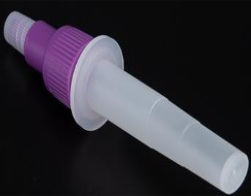Solid Phase Extraction (SPE) is a sample pretreatment technology developed since the mid-1980s. It is developed by the combination of liquid-solid extraction and liquid chromatography. Mainly used for the separation, purification and enrichment of samples. The main purpose is to reduce sample matrix interference and improve detection sensitivity.

Based on the theory of liquid-solid chromatography, SPE technology uses selective adsorption and selective elution to enrich, separate and purify samples. It is a physical extraction process including liquid and solid phases; it can also be approximated by regarded as a simple chromatographic process.
Schematic diagram of solid phase extraction device
SPE is the separation principle of liquid chromatography using selective adsorption and selective elution. The more commonly used method is to pass the liquid sample solution through the adsorbent, retain the substance to be tested, and then use a solvent of appropriate strength to flush out impurities, and then quickly elute the substance to be tested with a small amount of solvent, so as to achieve the purpose of rapid separation, purification and concentration. It is also possible to selectively adsorb interfering impurities and let the measured substance flow out; or to adsorb impurities and the measured substance at the same time, and then use a suitable solvent to selectively elute the measured substance.
The extractant of the solid-phase extraction method is solid, and its working principle is based on the fact that the components to be measured and the coexisting interfering components in the water sample have different forces on the solid-phase extraction agent, so that they are separated from each other. Solid phase extraction agent is a special filler containing C18 or C8, nitrile, amino and other groups.
Post time: Jun-14-2022



